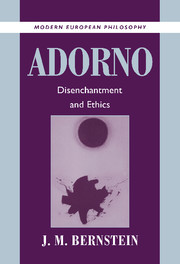Book contents
- Frontmatter
- Contents
- Preface
- List of Abbreviations
- Introduction
- 1 “Wrong Life Cannot Be Lived Rightly”
- 2 Disenchantment: The Skepticism of Enlightened Reason
- 3 The Instrumentality of Moral Reason
- 4 Mastered by Nature: Abstraction, Independence, and the Simple Concept
- 5 Interlude: Three Versions of Modernity
- 6 Disenchanting Identity: The Complex Concept
- 7 Toward an Ethic of Nonidentity
- 8 “After Auschwitz”
- 9 Ethical Modernism
- Index
Preface
Published online by Cambridge University Press: 05 June 2012
- Frontmatter
- Contents
- Preface
- List of Abbreviations
- Introduction
- 1 “Wrong Life Cannot Be Lived Rightly”
- 2 Disenchantment: The Skepticism of Enlightened Reason
- 3 The Instrumentality of Moral Reason
- 4 Mastered by Nature: Abstraction, Independence, and the Simple Concept
- 5 Interlude: Three Versions of Modernity
- 6 Disenchanting Identity: The Complex Concept
- 7 Toward an Ethic of Nonidentity
- 8 “After Auschwitz”
- 9 Ethical Modernism
- Index
Summary
Readers of Adorno are inevitably struck by how everything he wrote was infused with a stringent and commanding ethical intensity. As a consequence, his patent eschewals of praxis, ethical action, his constant defenses of both philosophical reflection and the claims of aesthetic experience in opposition to praxis, and the vivid absence of a philosophical ethics have not only been weapons in the hands of those who think his version of critical theory betrayed the Marxist tradition from which it sprang, but to those of us moved by his thought a continual source of bafflement, embarrassment, and regret. How could such ethically sensitive writing be so remote from actual ethical experience? How could a philosophy committed to the need for historical transformation be so silent, so abysmally reluctant when it came to political and ethical issues? That constellation of issues formed one side of the pressures leading to this book. The other side was my sense that Adorno's focus on the role of philosophical aesthetics, and within philosophical aesthetics his reflective championing of artistic modernism, was of a kind that made his thought all but inaccessible to a philosophical tradition in which no area could be more marginal to the central questions of philosophy than philosophical aesthetics. Of course, for Adorno himself philosophical aesthetics is fundamentally concerned with issues rationality and knowledge; but, however much I remain convinced by Adorno on this matter, and I have continued over the years to explore his aesthetic theory, my experience has been that my writing on these matters tends to speak only to the converted.
- Type
- Chapter
- Information
- AdornoDisenchantment and Ethics, pp. xi - xviPublisher: Cambridge University PressPrint publication year: 2001

